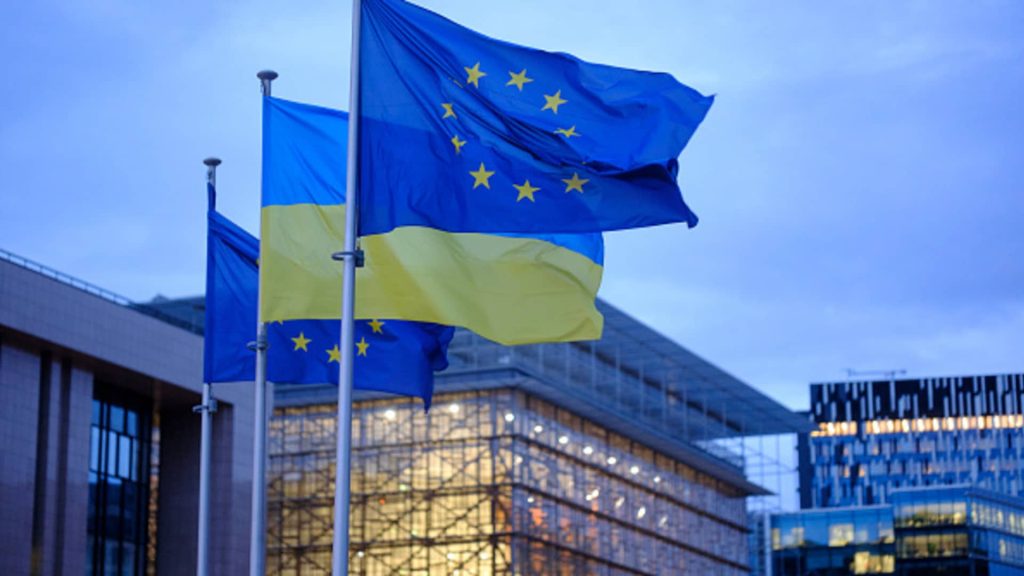The recent shift in U.S. foreign policy concerning Ukraine, following President Donald Trump‘s return to power, has prompted significant discussions among European nations about how best to support Ukraine amidst dwindling American aid. President Trump’s controversial remarks, assigning blame to Ukraine for the ongoing war, have led to stalled military support and escalating tensions. In response, European leaders are considering urgent measures such as seizing frozen Russian assets to bolster military aid and reconstruction efforts in Ukraine.
| Article Subheadings |
|---|
| 1) What are the Russian assets and where are they held? |
| 2) What could these assets be used for? |
| 3) Who in Europe supports and opposes using these assets for Ukraine? |
| 4) How would these assets be seized? |
| 5) What happens now? |
What are the Russian assets and where are they held?
The Russian assets in question largely refer to funds that have been frozen in various countries across Europe following the escalating tensions and resultant sanctions against Russia since its invasion of Ukraine in 2022. According to estimates, around €300 billion belonging to the Russian government is currently sitting in financial institutions across the European Union (EU) member states. This situation arose from punitive measures taken by the G7 and Europe aimed at crippling Russia’s financial capacity to sustain the war effort in Ukraine.
What could these assets be used for?
There has been a contentious debate surrounding the potential use of these frozen funds to support Ukraine directly. In June 2024, the G7 nations tentatively agreed to leverage these assets by issuing $50 billion in loans to Ukraine, supported by the profits generated from the seized funds. However, a hesitant approach has taken hold as European member states weigh the legal ramifications and economic implications of such a move while concurrently seeking robust reparation frameworks. The growing urgency to utilize these funds emerges from both humanitarian needs and military support in the effort against Russian aggression.
Who in Europe supports and opposes using these assets for Ukraine?
Among the EU leadership, there exists a mixed bag of opinions regarding the seizure of Russian assets for aiding Ukraine. Proponents include prominent figures like the EU foreign policy chief, Kaja Kallas, and the EU commissioner for economy, Valdis Dombrovskis. At a Foreign Affairs Council meeting in February, Kallas emphasized the need for an asset seizure agreement, stating, “our taxpayers should not be the ones who are paying for this.” On the contrary, nations like Germany and France have historically been more cautious, citing fears about the legalities and potential economic repercussions of such actions. Yet, recent shifts suggest their openness to reevaluating these positions amidst external pressures.
How would these assets be seized?
The legality around asset seizure is complex; however, European legal scholars suggest two potential pathways. One option involves all 27 EU member states reaching a unanimous decision to mandate asset seizure, possibly delegating Belgium to execute the confiscation process. Alternatively, Belgium could pursue individual action in the absence of a collective EU decision. Yet, apprehensions remain, primarily due to the legal and economic risks associated with such a seizure within the euro zone. The hurdles include balancing the long-term applicability of countermeasures under international law and the potential claim for damages that Ukraine could enforce against Russia through the confiscated assets.
What happens now?
As diplomatic discussions regarding the conflict continue, uncertainty looms over the future of international support for Ukraine. Analysts note that Russia is likely to demand the return of frozen assets as part of any negotiations, complicating the situation amidst reports of current U.S. military aid withdrawals. The urgency of European nations to step up their defense spending in light of these developments only amplifies calls for considerations around asset seizure. With officials acknowledging that such action might be a rational strategy, questions about Ukraine’s reconstruction and military funding loom large, emphasizing the stakes involved in the ongoing conflict.
| No. | Key Points |
|---|---|
| 1 | President Trump’s return has shifted U.S. support for Ukraine, causing alarm among European allies. |
| 2 | There are approximately €300 billion of frozen Russian assets in Europe. |
| 3 | Some EU officials are advocating for the complete seizure and reallocation of these funds to support Ukraine. |
| 4 | Legal and economic challenges remain significant hurdles for asset seizure efforts. |
| 5 | Diplomatic negotiations may influence the future accessibility of these assets during discussions with Russia. |
Summary
This pivotal moment in international relations highlights the delicate interplay between military support and economic consequences amid a protracted conflict. As Europe seeks a united front while navigating the complexities of international law and economic stability, the conversation about freezing and seizing assets symbolizes a growing urgency to act decisively in support of Ukraine’s sovereignty and territorial integrity. The decisions made in the coming months could define not only the future of Ukraine but also set precedents for international responses to state aggression.
Frequently Asked Questions
Question: What are the frozen Russian assets held in Europe?
The frozen Russian assets primarily consist of funds from the Russian government that have been blocked by European nations as part of sanctions initiated due to the invasion of Ukraine.
Question: Why is there a debate about seizing these assets?
The debate centers on the potential use of these assets to aid Ukraine’s military and humanitarian efforts against Russian aggression, raising legal and economic questions among member states.
Question: What are the potential consequences of seizing Russian assets?
Seizing assets could strain international law principles and create economic repercussions for the euro zone, while also impacting ongoing diplomatic negotiations with Russia.
